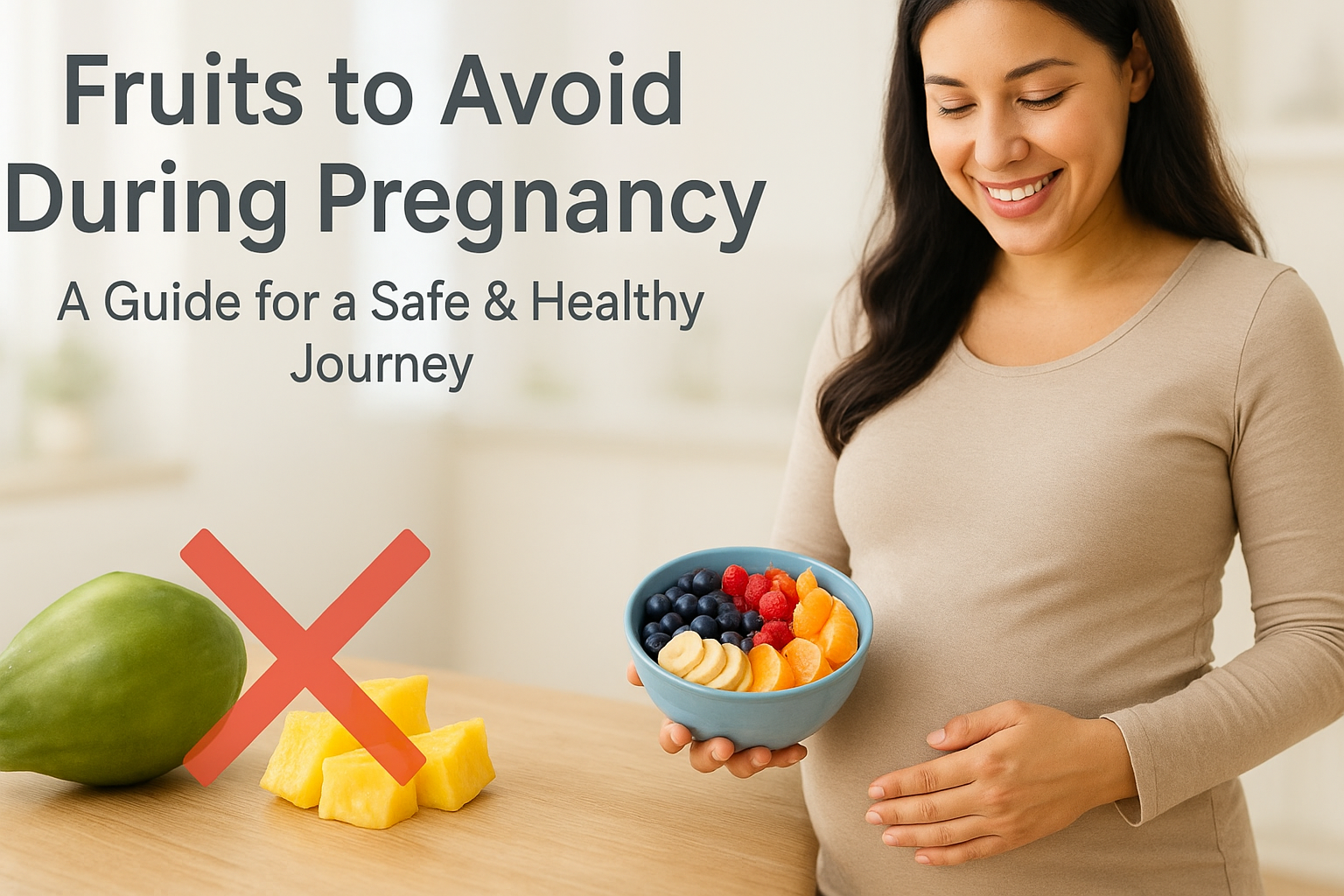
Fruits to Avoid During Pregnancy A Safe and Healthy Guide
Navigating your diet during pregnancy can feel overwhelming. While loading up on nutrient-dense fruits is highly encouraged, knowing which fruits to avoid during pregnancy is crucial for your baby’s safety and your peace of mind. You’re not just eating for two; you’re protecting two.
This guide cuts through the confusion to give you a clear, evidence-based list of fruits to avoid or approach with extreme caution during this special time. Our focus is on keeping you and your little one safe, informed, and healthy.
The Short List: Fruits to Avoid During Pregnancy
It’s important to understand that most whole fruits are fantastic for pregnancy. However, a few specific ones carry real risks. Here are the primary fruits you should consciously avoid.
1. Unripe or Semi-Ripe Papaya
This is the most critical fruit to avoid, and for a very good reason.
- Why You Must Avoid It: Unripe papaya is rich in a latex substance that contains high concentrations of an enzyme called papain. Papain acts like the hormones prostaglandin and oxytocin, which can trigger uterine contractions and premature labor. In the worst cases, especially during the sensitive first trimester, consuming unripe papaya can lead to miscarriage.
- What About Ripe Papaya? A fully ripe, orange-skinned papaya has significantly lower levels of papain and is generally considered safe by many experts due to its high vitamin C and fiber content. However, because the line between semi-ripe and ripe can be blurry, many healthcare providers recommend avoiding all forms of papaya throughout pregnancy to eliminate any risk entirely.
2. Pineapple: Tread with Extreme Caution
Pineapple often finds itself on the “fruits to avoid during pregnancy” lists, and while the risk is dose-dependent, caution is strongly advised.
- Why It’s Risky: Pineapple contains bromelain, a proteolytic enzyme. In very large, concentrated amounts, bromelain can soften the cervix, potentially leading to irregular contractions and early labor.
- The Verdict: You would need to consume an extremely large quantity (think 7-10 whole fruits at once) to reach dangerous levels. However, because individual sensitivity can vary, and given the high stakes, it is often recommended to avoid pineapple, particularly during the first trimester. If you choose to consume it, do so in very small, infrequent amounts (a few chunks now and then).
3. Unwashed and Pre-Cut Fruits: The Hidden Dangers
While not a specific fruit type, this is perhaps the most common and dangerous category of “fruits to avoid during pregnancy.”
- Why You Must Avoid Them: The surface of fruits can be contaminated with harmful pathogens like Listeria, Toxoplasma gondii, and Salmonella from the soil. Pre-cut fruits, while convenient, have an increased surface area and are handled more, raising the risk of bacterial growth. These infections can have severe consequences for your baby, including miscarriage and stillbirth.
- The Safe Alternative: Avoid pre-cut fruits from salad bars or stores. Always buy whole fruits and wash them thoroughly under running water before peeling or eating, even if you don’t plan to eat the skin (like on melons). This simple step is one of the most important food safety practices during pregnancy.
Fruits That Are Pregnancy Superstars
Now that we’ve covered what to avoid, here’s what you should definitely be eating! These fruits are packed with the vitamins, minerals, and fiber you and your baby need:
- Bananas: Excellent for morning sickness and a great source of potassium and energy.
- Berries (Strawberries, Blueberries, Raspberries): Powerhouses of antioxidants, vitamin C, and fiber.
- Oranges and Clementines: Hydrating and full of folate and vitamin C for healthy development.
- Avocados (Yes, it’s a fruit!): Loaded with healthy fats, folate, and potassium, which are crucial for your baby’s brain and tissue growth.
- Apples: Great for fiber to combat pregnancy constipation and rich in vitamin K.
Making informed choices empowers you to have a healthy, happy pregnancy. When in doubt, always err on the side of caution and consult your healthcare provider.
Frequently Asked Questions (FAQs): Fruits to Avoid During Pregnancy
Q1: I ate some pineapple before I knew it was a fruit to avoid. Should I panic?
A: No, please do not panic. The risk from bromelain is associated with extremely high, concentrated consumption. A normal serving is very unlikely to cause any harm. The important thing is that you are now informed. Simply avoid it moving forward for peace of mind.
Q2: Is it safe to drink packaged papaya or pineapple juice?
A: Most commercially packaged juices are made from ripe fruit and are pasteurized, which kills bacteria. However, it can be hard to know if unripe fruit was used. Check the label for pasteurization. To be 100% safe, it is often better to avoid these specific juices and opt for safer alternatives like orange or apple juice.
Q3: What about grapes? I’ve heard they should be avoided too.
A: This is a common myth. There is no strong scientific evidence that grapes are dangerous. The concerns are typically about pesticide residue on the skin and their high sugar content. The solution is simple: wash grapes meticulously under running water, and enjoy them in moderation as part of a balanced diet.
Q4: Are frozen fruits safe, or are they a fruit to avoid during pregnancy?
A: Frozen fruits are an excellent and safe choice! They are typically washed and flash-frozen at peak ripeness. They are perfect for smoothies. Just ensure you handle them properly—thaw them in the refrigerator, not on the counter, to prevent bacterial growth.
Q5: Can I eat watermelon while pregnant?
A: Yes! Watermelon is highly recommended. It’s incredibly hydrating, can help reduce swelling (edema), and is gentle on the stomach. It is not a fruit to avoid during pregnancy.
Q6: What is the #1 rule for eating fruit safely during pregnancy?
A: WASH, WASH, WASH! The single most important thing you can do is thoroughly wash all fruits and vegetables under running water before eating them. This simple act drastically reduces the risk of exposure to harmful bacteria and parasites.
